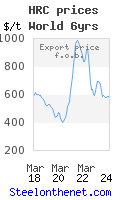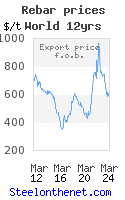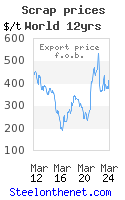Impact of Brexit on UK steel sector
The following extract is from an ISSB discussion about the probable impact of Brexit on the UK
There has been much conjecture over both the short-term and long-term effects of the UK
One important aspect is the effect the vote will have on markets for steel products, and in particular the key automotive and construction sectors. The UK
The factors affecting the construction industry are rather different. Although the market has been strong in recent months with an estimated 9% growth in steel-intensive heavy construction based on heavy section sales, the Brexit vote brings uncertainty to the industry. The share price performance of the UK's listed construction companies hints at the fact the market is viewing a slowdown as likely with the construction of large steel-intensive buildings reliant to some extent on the economic health of the country as a whole. The industry may also experience cost inflation, particularly in regard to worker wage inflation if restrictions are placed on skilled EU workers entering the country.
While the outlook for the markets for steel products is mixed, the vote could potentially offer some hope to the steel industry. The UK Britain
If domestic markets are about to enter uncertain times then more importance may be given to UK
Again, the success of the export market will likely depend on trade agreements struck with the US
The EU as a whole is the most important export market for the UK Germany , Ireland and Belgium were the most important single markets in the EU, although it should be noted that non-EU Turkey was the largest market for UK
Of importance, however, is the fact that this export figure was dwarfed by the import tonnage, with imports from the EU accounting for 71% of the total with the tonnage from the EU being nearly twice that of exports, at 1.2 million tonnes. This means that the UK UK imported more than 100K tonnes from each of the following member states: Germany , Spain , the Netherlands , Belgium and France UK was also the second largest "non-EU" destination for German steel after Switzerland
Whilst the British vote to leave the EU will likely cause heightened uncertainty and risk and much depends on the political will and diplomatic nous of the leaders of the country, it seems clear that there are potential opportunities for an industry that has suffered its fair share of issues over the past year.
For further information visit the ISSB website at http://www.issb.co.uk or check out http://www.steelonthenet.com for the latest steel news.
Labels: Brexit steel, Brexit UK steel, Brexit UK steel industry, ISSB, UK steel, UK steel industry, UK steel sector




0 Comments:
Post a Comment
<< Home